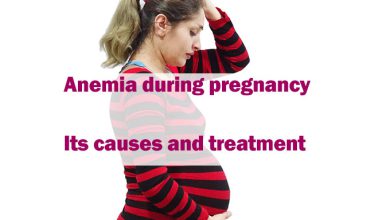22 early signs of pregnancy
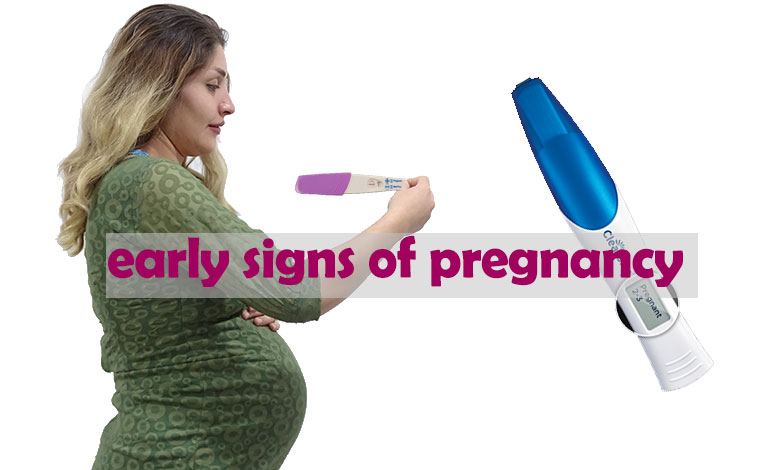
In general, the beginning of pregnancy is different for every woman. Some women may experience the first symptoms after 1 or 2 weeks of pregnancy, while the experience of pregnancy symptoms for some people can last for months. This is due to the woman’s ability to recognize changes occurring in the body. Using a blood test, pregnancy can be detected 1 week after conception.
The best way to confirm pregnancy after experiencing early pregnancy symptoms
The best way to confirm pregnancy is a pregnancy test. A pregnancy test measures the human chorionic gonadotropin (HCG) hormone in the blood. Women can also perform this test at home using a pregnancy test strip (Baby Check). Home pregnancy test strips are relatively reliable, but sometimes the result can be pseudo-positive, which can happen for reasons such as ectopic pregnancy or even taking certain medications.
Related article: Anemia during pregnancy
some of the earliest pregnancy symptoms
Pregnancy symptoms usually appear in the first week of pregnancy. However, the excitement and anxiety of pregnancy can cause you not to notice. But there are ways to know if you’re pregnant. In the following, we will review some of the early symptoms of pregnancy.
1: Interruption of the period
Menstruation delay or lack of menstruation is the most common symptom of pregnancy, which makes most women doubt whether they are pregnant. If you get pregnant, you won’t have a period. The most obvious sign of pregnancy is the cessation of menstruation, but it is not the only sign of pregnancy.
One question that may exist for many women is, is it possible to get pregnant and have periods during pregnancy? In answer to this question, some women may bleed during pregnancy, but usually, this bleeding is shorter or less than a normal menstrual period.
2: Nausea or morning sickness
Feeling nausea during the day or morning sickness is the second most common symptom in pregnancy, frequently reported by 80% of women. In most women, nausea usually occurs 2-8 weeks after pregnancy.
Nausea can also be accompanied by vomiting. Nausea can occur at any time of the day. This problem usually occurs in the first 3months of pregnancy and then gradually fades away in most women. But nausea may continue in some pregnant mothers until the end of pregnancy.
3: Spotting or light vaginal bleeding
According to the American Pregnancy Association (APA), spotting can occur 6 to 12 days after intercourse. In the case of pregnancy, this symptom usually occurs due to bleeding at the time of implantation of the ovum in the uterine wall and is considered one of the first symptoms of pregnancy.
The embryo usually attaches itself to the uterine wall between 6 and 12 days after conception. Some women experience spotting and muscle cramps at this time. Bleeding or spotting during implantation is normal and nothing to worry about.
Of course, some women don’t even notice bleeding or muscle cramps. So if you are planning to get pregnant, but you haven’t experienced these symptoms, don’t worry.
4: Swelling and pain in the breasts
The third most common symptom in pregnancy is swelling or tenderness of the breasts. Making these breast changes can begin 1 to 2 weeks after pregnancy. The breast can also be larger and change its appearance.
5: Fatigue and lethargy
From the beginning of the first week after pregnancy, many women experience fatigue or lethargy, even after doing small daily tasks. These symptoms occur because progesterone levels increase and the body prepares to deal with the changes that occur during pregnancy.
The body also produces more blood to support the growing fetus, which leads to increased fatigue. This tiredness can be combated with a healthy diet, rich in mineral salts, vitamins, iron, and plenty of liquids.
The fatigue and lethargy usually disappear within the second 3 months, but they may experience them again as the date of delivery approaches. Hormonal changes can also interrupt sleep during the first few weeks of pregnancy.
6:Backache
Back pain is one of the common pregnancy symptoms. Back pain can occur in early pregnancy but is usually experienced with the progress of pregnancy and between the 27th and 34th week of pregnancy.
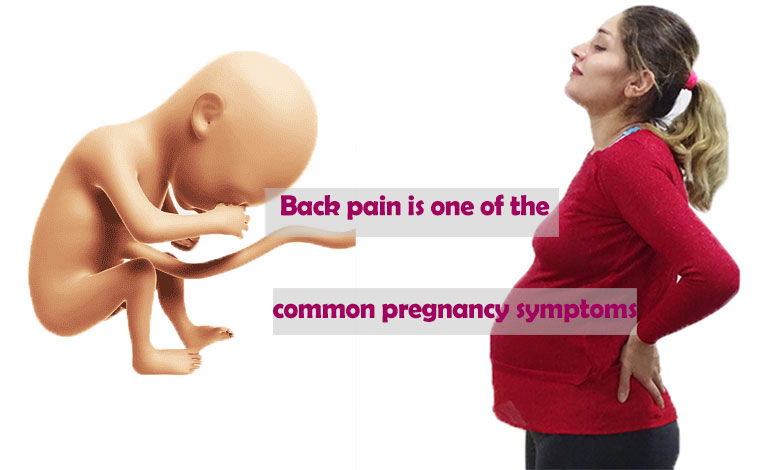
7:Heahache
Obstetricians and gynecologists believe that the sudden increase in hormones and blood flow in the body causes headaches. The amount of blood circulating in the veins increases by almost 50% during pregnancy.
8:Frequncy urination
Do not be surprised if you feel that you need to urinate more than usual during pregnancy, especially during weeks 6 to 8. During pregnancy, the growth of the baby in the womb and the enlargement of the uterus cause more pressure on the bladder and the frequency of urination.
9: Craving for food
Excessive food cravings can occur in early pregnancy or at any time during pregnancy. Food preferences are very different for every expectant mother, also some women may not like different smells. Sometimes the smell of your wife’s perfume can make you uncomfortable. Pregnancy hormones play an important role in expectant mothers’ desire to eat. As long as you follow proper nutrition during pregnancy, you don’t have to be hard on yourself or avoid food.
10: Darkening of the areolae of the breast
Another thing that happens during pregnancy is the darkening of the colored halo on the nipple, which is called the areola. You may also experience itching or tingling in the breasts.
11: Mood changes
Some pregnant mothers experience mood changes, the main cause of which is hormonal changes. These hormonal changes affect neurotransmitters in the brain. Mood swings work in mysterious ways, making you sensitive to the smallest or mundane problems and even causing you to cry. Some women may experience states of happiness, depression, or anxiety.
Experiencing mood changes during pregnancy is completely normal. But if you’re struggling with long-term depression, it is recommended to talk to a psychiatrist.
12:Increase in body temperature
Some women measure their body temperature to record their menstrual cycle and when they ovulate. If you have done this, you may have noticed that your body temperature normally decreases a day before your period starts and before ovulation, your body temperature increase during pregnancy, due to the increased level of progesterone, and the basal body temperature always remains high. If your body temperature stays high even when you’re expecting your period, it could be a sign of pregnancy.
13: dizziness
Dizziness and lightheadedness are early pregnancy symptoms that occur in some pregnant mothers. The dilation of blood vessels lowers blood pressure. Consequently, the person feels stunned and imbalanced.
This symptom occurs in the first 3 months and gradually decreases. However, if vertigo with vaginal bleeding and abdominal pain occurs, you should consult your doctor as soon as possible.
14: Constipation
The progesterone hormone leads to decreased intestinal movements and constipation.
15: Hemorrhoids Or Hemorrhoids
It seems that due to the pressure exerted to pass stool during constipation, hemorrhoids or hemorrhoids are formed, which are unpleasant and even painful. Following a proper diet and using anti-hemorrhoid ointments can be very helpful in improving symptoms.
16: Feeling a strange taste in the mouth
Changes in the level of hormones can cause an inappropriate and strange taste in the mouth during pregnancy. It may feel like you swallowed metal. The metallic taste in the mouth usually disappears after the first 3 months. But getting rid of the metallic taste in the mouth can take longer for some women.
17: shortness of breath
Difficulty breathing can be one of the early symptoms of pregnancy. During pregnancy, the body has to cover the oxygen needs of two people. As a result, you need more blood to breathe through the lungs.
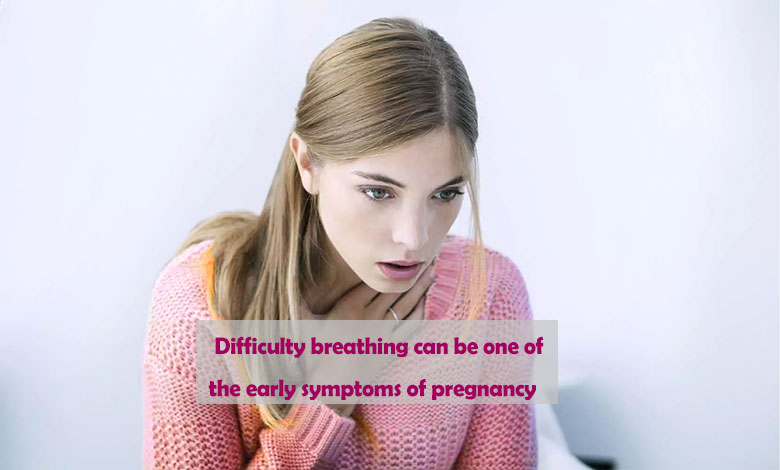
In addition, uterine growth makes the intestines rise. This puts pressure on the diaphragm and therefore the lungs and causes shortness of breath.
18: Hot flashes
A very common thing that women experience during their period and menopause is hot flashes. This sign can also be an early sign of pregnancy.
19: Swelling of the legs
Increasing the size of the feet may be due to swelling of the feet during pregnancy. According to studies, 60 to 70 percent of women experience this problem during pregnancy.
20: Change in skin color
Changes in hormone levels during pregnancy can raise melanin levels. Melanin is a skin pigment that creates different colors in the skin. An increase in melanin in the skin can cause dark patches on the skin called melasma. Sunscreens and sunscreen help prevent melasma. Melasma is mostly seen on the face.
21: Heartburn
The cardia is a muscular valve located at the end of the esophagus. The role of this valve is to prevent stomach contents from returning to the esophagus. Pregnancy hormones relax the cardiac sphincter. As a result, expectant mothers can experience acid reflux and heartburn. Enlargement of the uterus causes pressure on the stomach and, as a result, intensification of stomach acid reflux pain. Avoiding fatty and spicy foods may help prevent this.
22: Hip pain
Interestingly, hormones naturally soften the hip joints and ligaments. This helps the body prepare for childbirth. But this change can cause discomfort in the hip and hip joints. In Doktorto you can get to know the best gynecologists and obstetricians in your city, consult them by phone or online, and also make an appointment for a face-to-face visit.
In addition to these cases, which are common complications during pregnancy, sometimes pregnancy complications occur that place the pregnancy in the category of high-risk pregnancies.
Some of these cases are hypertension, gestational diabetes, twin or multiple pregnancies, ies, and such cases, where the importance of taking care of yourself and the baby will be doubled.
The purpose of mentioning all these things is not to scare pregnant mothers or women who are planning a pregnancy, but to inform women about the health of their body and to give accurate and correct information away from excessive anxiety; Although all growth and development in our life will be accompanied by anxiety and stress, so if you are pregnant or planning to become pregnant, it is better to try to know and discover your body in order to be fully prepared for it instead of being scared. of the correct and scientific aspects of pregnancy, it is your decision.
early signs of pregnancy discharge how long does it last?
If you’re wondering whether or not you might be pregnant, one of the first signs to look for is vaginal discharge.
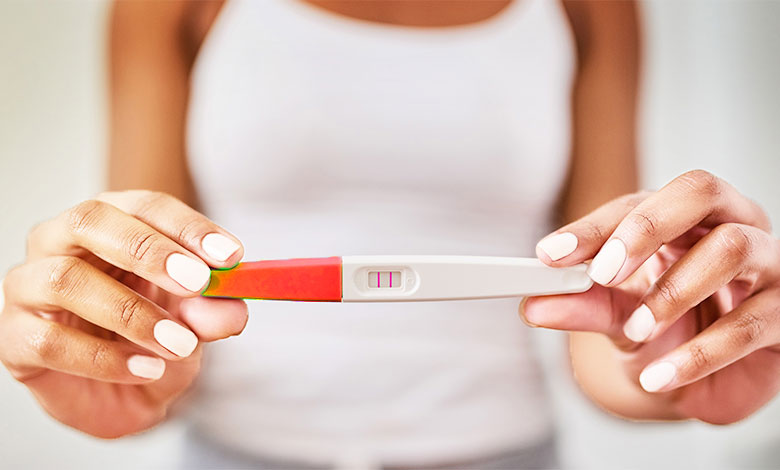
Vaginal discharge is normal during pregnancy and can start as early as a week after conception. It won’t be noticeable at first, but it may become more noticeable as time goes on.
Some women experience a pink or brownish color, while others notice a milky white discharge that resembles mucus. This is normal!
The amount of discharge can vary from woman to woman and will often change throughout the day. It may also change based on your stage of pregnancy—the amount of discharge tends to increase during your third trimester.
conclusion
In conclusion, recognizing the early signs of pregnancy is crucial for women who are trying to conceive or are concerned about a potential pregnancy. While not all women will experience the same symptoms or severity of symptoms, it’s important to pay attention to changes in the body and take a pregnancy test if there is any suspicion.
Early prenatal care can greatly improve the health outcomes for both the mother and the developing fetus, so it’s important to seek medical attention as soon as possible after a positive pregnancy test. By understanding the early signs of pregnancy and taking steps to care for themselves and their growing baby, women can have a healthy and successful pregnancy.
